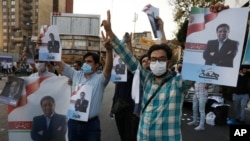ຊາວອີຣ່ານຈະອອກໄປຫາສະຖານທີ່ປ່ອນບັດໃນວັນສຸກມື້ອື່ນນີ້ ເພື່ອເລືອກເອົາປະທານາທິບໍດີຄົນໃໝ່ທ້າມກາງວິກິດການດ້ານເສດຖະກິດຢ່າງໜັກໜ່ວງ ແລະຄວາມເຄັ່ງຕຶງທີ່ມີຢູ່ກັບປະເທດຕາເວັນຕົກ ກ່ຽວກັບໂຄງການນິວເຄລຍຂອງຕົນ.
ໂດຍການຫ້າມໃຫ້ມີການຕິດຕາມກວດກາຂອງສາກົນ ແລະຜູ້ສະໝັກທຸກຄົນທີ່ຖືກເລືອກໂດຍອໍານາດການປົກຄອງ, ພວກນັກວິຈານກ່າວວ່າ ການເລືອກຕັ້ງແມ່ນບໍ່ມີເສລີພາບ ຫຼືຍຸດຕິທຳເລີຍ- ແລະນັກວິເຄາະກ່າວວ່າ ຄວາມບໍ່ພໍໃຈຂອງປວງຊົນໝາຍເຖິງການມີຄົນໄປປ່ອນບັດເລືອກຕັ້ງໃນຈໍານວນຕໍ່າ.
ເສດຖະກິດຂອງອີຣ່ານໄດ້ຄ່ອຍໆຫຼຸດລົງເປັນເວລາເກືອບ 3 ປີທີ່ຜ່ານມາ. ອັນທີ່ເອີ້ນວ່າ “ຄວາມກົດດັນສູງສຸດ” ມາດຕະການລົງໂທດຖືກວາງອອກໂດຍອະດີດປະທານາທິບໍດີສະຫະລັດ, ທ່ານດໍໂນລ ທຣໍາຫຼັງຈາກທ່ານໄດ້ຖອນສະຫະລັດອອກຈາກຂໍ້ຕົກລົງນິວເຄຼຍອີຣ່ານໃນປີ 2018, ໂດຍກ່າວຫາເຕຫະຣານວ່າ ພາໃຫ້ຂາດສະຖຽນລະພາບໃນພາກພື້ນ, ເຊິ່ງເຕຫະຣານໄດ້ປະຕິເສດ.
"ມາດຕະການລົງໂທດເຫຼົ່ານີ້ໄດ້ສົ່ງຜົນກະທົບຕໍ່ເສດຖະກິດຂອງອີຣ່ານໃນແບບທີ່ໜັກໜ່ວງ, ແຕ່ສຳຄັນເໜືອສິ່ງໃດໝົດ ແມ່ນມັນໄດ້ສົ່ງຜົນກະທົບຢ່າງເລິກເຊິ່ງຕໍ່ຊາວອີຣ່ານທຳມະດາສາມັນທຸກຄົນ ທີ່ກຳລັງປະສົບກັບລາຄາສິນຄ້າທີ່ແພງຂຶ້ນ ແລະສະກຸນເງິນທີ່ກຳລັງອ່ອນຄ່າລົງ," ນັ້ນຄືຄໍາເວົ້າຂອງທ່ານ ຊານາມ ວາຄີລ (Sanam Vakil), ຮອງຫົວໜ້າໂຄງການພາກຕາເວັນອອກກາງ ແລະທະວີບອາຟຣິກາເໜືອຢູ່ທີ່ສະຖາບັນຊາດທໍາ ຫລື Chatham House ກ່າວໃນລະຫວ່າງທີ່ໃຫ້ສຳພາດກັບວີໂອເອ.
ທ່ານວາຄີລ ກ່າວຕື່ມວ່າ "ຕໍ່ກັບສະພາບການນີ້, ແນ່ນອນ, ອີຣ່ານຍັງໄດ້ລອດພົ້ນຈາກໂຄວິດ-19, ມັນມີອັດຕາການຕາຍສູງທີ່ສຸດຢູ່ໃນພາກຕາເວັນອອກກາງ."
ອີງຕາມຕົວເລກຂອງລັດຖະບານ, ອີຣ່ານໄດ້ບັນທຶກວ່າມີຜູ້ເສຍຊີວິດທີ່ກ່ຽວ ຂ້ອງກັບໂຄວິດ-19 ຫຼາຍກວ່າ 82,000 ຄົນ, ເຖິງແມ່ນວ່າຕົວເລກທີ່ແທ້ຈິງອາດຈະສູງກວ່ານັ້ນຫຼາຍ.
ປະທານາທິບໍດີຄົນຕໍ່ໄປຈະສືບທອດຕຳແໜ່ງແທນ ທ່ານຮາຊຊານ ຣູຮານີ (Hassan Rouhani) ຜູ້ທີ່ໄດ້ດຳລົງຕຳແໜ່ງສູງສຸດບໍ່ເກີນສອງສະໄໝ. ຜູ້ສະໝັກທັງໝົດ ລ້ວນແຕ່ໄດ້ຮັບການອະນຸມັດ ແລະຜ່ານການພິຈາລະນາຈາກສະພາປົກປ້ອງການປົກຄອງຂອງອີຣ່ານ.
ຍັງມີຜູ້ສະໝັກ 4 ຄົນເທົ່ານັ້ນ ທີ່ເຫຼືອຢູ່ຫລັງຈາກ 3 ຄົນໄດ້ຖອນຕົວອອກຈາກການແຂ່ງຂັນ ໃນວັນພຸດວານນີ້. ສາມຄົນໃນນັ້ນ ຖືກເບິ່ງກັນວ່າ ເປັນຜູ້ມີອະນຸລັກນິຍົມທີ່ແຂງກະດ້າງ, ມີຜູ້ສະໝັກທີ່ມີຫົວປະຕິຮູບຄົນດຽວທີ່ຍັງເຫຼືອ ຊື່ຢູ່ໃນບັດເລືອກຕັ້ງນັ້ນ.
ອ່ານຂ່າວນີ້ເປັນພາສາອັງກິດ
Iranians head to the polls Friday to choose a new president amid an acute economic crisis and ongoing tensions with the West over its nuclear program.
With international monitors banned and all candidates selected by the regime, critics say the election is far from being free or fair — and analysts say public discontent could mean a low voter turnout.
Iran’s economy has been shrinking for most of the last three years. So-called “maximum pressure” sanctions were imposed by former U.S. President Donald Trump after he withdrew the United States from the Iran nuclear deal in 2018, accusing Tehran of destabilizing the region, which Tehran denies.
“These sanctions have impacted Iran's economy in a significant way, but above all, deeply impacted all ordinary Iranians that are suffering from rising prices and a declining currency,” Sanam Vakil, deputy head of the Middle East and North Africa program at London-based Chatham House, said in an interview with VOA.
“Against this backdrop also, of course, Iran has weathered COVID-19, it has the highest death rate in the Middle East,” Vakil added.
According to official government figures, Iran has recorded more than 82,000 COVID-19-related deaths, although the true figure could be much higher.
The next president will succeed Hassan Rouhani, who has served the maximum two terms in office. All the candidates were approved and vetted by the Iranian regime’s Guardian Council.
Only four candidates remain after three pulled out of the race Wednesday. Three are seen as hard-line conservatives, with only one reformist candidate left on the ballot.
The favorite to win is 60-year-old Ebrahim Raisi, the head of Iran’s judiciary. His past involvement in human rights abuses would make him a problematic president for the West, said Iran analyst Behnam Ben Taleblu of the Washington-based Foundation for the Defense of Democracies.
“He's unfortunately most famous for his despicable oversight of what is called a so-called death commission in the late 1980s that carried out the murder edict from Ayatollah Khomeini, that killed upwards of 5,000 political prisoners in Tehran,” Taleblu said.
He said turnout will give an indication of the voters’ mood.
“There are two important groups to keep your eyes on: the regime itself, in particular, embodied by the supreme leader, Ali Khamenei, who really is Iran's only voter of consequence; and the Iranian people themselves, and if they turn out,” Taleblu told VOA.
“The regime itself, in every iteration of the ‘election’ since 2009, has been gutting the left flank of its political system, further contracting the boundaries for acceptable space, and with Khamenei at the helm, dragging the system further to the hard right,” Taleblu added.
Speaking Wednesday in Tehran, Rouhani urged Iranians to turn out and vote.
“The way of expressing our complaints is not turning our backs on ballot boxes. That's not the solution. We have better ways. I tell our people that turning away from the ballot box does not resolve anything for us. Some may say that the situation has become so tough for us. I tell them to cast their votes, despite troubles. Going to the polling stations in present circumstances will consolidate your system and makes us more powerful. Not voting does not do us any good. What is the benefit in that?” he said.
The incumbent had earlier criticized the Guardian Council for widely barring pro-reform candidates from running in the vote.
Iran has been rocked by a series of events that have shaped the electoral landscape. The targeted killing of Iranian General Qassem Soleimani in January 2020 by a U.S. drone strike prompted widespread public fury. Days later, Iranian forces accidentally shot down a Ukrainian passenger jet, resulting in the deaths of all 176 onboard. The incident prompted anti-government protests in several cities.
“So, there have been a cycle of interconnected events that have dampened popular sentiment, and in November 2019, protests over rising oil prices were also brutally repressed. So, ordinary Iranians are not particularly inclined to vote,” said Vakil.
Iran has significantly ramped up its nuclear enrichment since the United States left the 2015 accord, known as the Joint Comprehensive Plan of Action, or JCPOA. Iran is believed to be just months away from creating enough fissile material for a nuclear weapon. The U.S. is considering rejoining the 2015 nuclear deal, but only if Iran halts enrichment. Iran says the U.S. must first suspend sanctions. Talks in Vienna are ongoing.
“The lifting of sanctions would be a huge boon that could have a trickle-down effect, that would be hugely meaningful for ordinary people. That said, I think Iranians today are less invested in the Iran nuclear agreement and less trustful of the United States or European countries,” Vakil said.
All Iran’s presidential candidates support negotiations to revive the nuclear deal.
“There is an expectation that with the election completed, perhaps there will be more confidence on the Iranian side in Vienna to get the deal done,” Vakil said.
With Khamenei in his 80s, the handover of power to his successor is expected in the coming years, adding further complexity to the challenges facing Iran’s next president.





